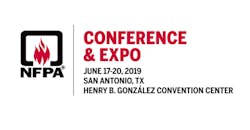NFPA 2019 Conference to Focus on Workplace Safety, Risk Reduction
The National Fire Protection Association will host its annual Conference & Expo at the Henry B. Convention Center in San Antonio, June 17 – 20. This comprehensive event brings together thousands of the industry’s leading professionals who will attend more than 120 educational sessions and special events addressing the latest issues, challenges and trends in the world of fire, electrical and life safety.
This year’s expo, featuring more than 325 exhibitors, brings to life the products and services needed to meet and maintain compliance with prevailing codes and standards in the design, construction and operation of buildings and facilities of every kind. The expo floor will also feature an emerging technologies and electrical pavilion, offering product displays with hands- on learning and an immersive virtual reality experience for contractors and electricians, inspectors and building officials, among others.
Notable presentations include:
• Active Shooter/Hostile Event Response and NFPA 3000 (PS) Program: Lessons Learned and a New Standard; June 18, 8 a.m. to 12 p.m.
With an increase in gun-related incidents around the nation, a panel of experts will explain recent events that led to the creation of NFPA 3000 (PS). The session will include lessons learned from the specific events in which active shooters were involved, followed by a discussion that includes an overview of the content of the standard and the roles and responsibilities of those working to prevent future incidents.
• Is it time to P.A.N.I.C.? Shifting Community Risk Reduction from Concept to Reality; June 17, 8:00 to 9:00 a.m.
Find out what the P.A.N.I.C. is all about! Community risk reduction (CRR) is a process that identifies and prioritizes local risks to ensure integrated and strategic resource investment to reduce the occurrence and impact of dangerous risks. While CRR is discussed in many fire departments, a full implementation is often hindered by challenges. During this interactive discussion, presenters will break down five strategic actions to drive successful CRR implementation and overcome common barriers.
Attendees will find out why successful CRR programs include input from officers, operations and the overall community, learn real-world examples of the process in action and have the chance to generate additional solutions.
• Making Hot Work Safety An Everyday Practice: June 17, 8:00 a.m. to 12:00 p.m.
In its 2016 fire incident report, “Structure Fires Started by Hot Work,” NFPA presents data showing a U.S. annual average of more than 4,000 fires caused by hot work — and that doesn’t account for those in industrial occupancies, including oil and gas sector worksites. U.S. Chemical Safety Board, OSHA and industry-specific reports confirm that hot work incidents are becoming increasingly common.
Participants will receive practical guidance regarding flammable liquids or gases, including the essentials for monitoring concentration buildup of vapors that cannot be seen or detected without special monitoring devices.
• When Uber Meets Octane: Fire Code Requirements for On-Demand Fueling: June 18, 5:00 to 6:00 p.m.
NFPA 30A and the 2018 International Fire Code have new provisions for on-demand fueling where gasoline or diesel fuel can be delivered directly to a consumer's vehicle using a smartphone. This presents a variety of regulatory and emergency response issues to the fire service. This presentation reviews key technical requirements in NFPA 30A, 2018 IFC, US DOT regulations and the potential risks to emergency responders.
• A New Standard for Energy Storage Systems: NFPA 855: June 12, 9:15 to 10:15 a.m.
As the energy storage industry continues to grow, NFPA is engaged in a number of initiatives aimed at promoting the safe and sustainable expansion of this renewable technology. One of NFPA's most substantial contributions is the creation of NFPA 855, Standard for the Installation of Stationary Energy Storage Systems. Get the most up-to-date and in-depth information on the contents of the new NFPA 855, which should be published or may have notices of intent to make a motion at the 2019 NFPA Technical Meeting.
